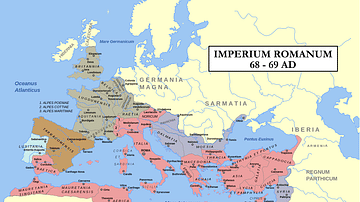Server Costs Fundraiser 2024
Review

| Rating: | |
|---|---|
| Title: | |
| Author: | Anonymous |
| Published: | 1970 |
Susan Niditch, Professor and Chair of Religion at Amherst College, explores the various self-expressions of lived religion in the Jewish, post-exilic environment. With research interests and works in the ancient Near East, early Judaism, and the body in ancient Judaism, Niditch's exploration of lived religion in ancient Israel during the post-exilic period is an excellent study in continuity with her interests and previous publications. The Responsive Self is a prime example of solid scholarship which draws out the personal and lived elements of ancient Israel.
Niditch's work emerges from Lived Religion, the work of sociologist of religion Meredith B. McGuire, and McGuire's discussion regarding the complex dynamics between concrete practice, diversity, official and unofficial. Her analysis and case studies of lived religion are guided by five bearings: physical environment, authorial declaration about material culture, “non-Judean Jews”, the role of Persian culture to Yehud, and chronology.
The first case study is based on a folkloric and contextualized reading that demonstrates the theodicy focus and innovative approach to lived religion dealing with sin in the works of Ezekiel and Jeremiah. In its engagement with Job and Qohelet, Chapter Two analyzes their appropriation of conventional wisdom, with special regard for death, and illustrates how their critical self-evaluation exemplifies lived religion, rather than communal or balance, in a post-exilic context. Chapter Three's examination of lament as means of incantation traces the self-representative trajectory from incantation to autobiography in Jeremiah's confession and Nehemiah's memoir. With regard to vowing and personal religion, Chapter Four discusses personal, lived religion and its dynamics between personal and public religion in Nazirite and votive offerings.
In the following chapter, Niditch presents post-exilic burial art and graffiti, symbolic visions of Zechariah, and sign acts of Jeremiah to illustrate the lived religion of ancient Israel through materials. Chapter Six examines prophetic encounters with the divine realm, which paradoxically reflects cultural conceptions of religious experience and personal reflection, and the concurrent and interactive dynamics of official and unofficial religion. Chapter Seven draws out the self-characterization in Ruth's narrative, as opposed to Tamar's narrative, and the book of Jonah, both of which express thoughts of emotion rather than ritual reflective of emotion. Her work, thus, explores the patterns of culture and humanities capacity to adjust traditions to their sociohistorical setting and skillfully draws out the complexities between the communal and individual, material and meta-physical, and self-expression in religion as lived.
One of the most praiseworthy successes in The Responsive Self is her ability to make significant the religious lives of ancient authors. Rather than subjecting texts to critical analysis to the end of critique, Niditch draws out the humanity of the post-exilic texts. For example, regarding nonbiblical incantaion, she notes that “these texts implicitly offer reasons for life's challenges and testify to the human need for such explanations” (54). So beyond mere textual analysis, her work demonstrates the breadth of human experience, a most notable and consistent aspect in her work.
With regard to analysis, the only point which should have been more fully explored is how allusions to the combat myth seen in the raging Sea contributed to the self-expression of the book of Jonah. As Debra Ballentine has recently explored, the combat myth is appropriated by a variety of audiences and is not necessarily universally under the banner of Chaoskampf. Were Niditch to consider this in her analysis of Jonah, it would have demonstrated better how authors utilized older traditions innovatively to express the self.
Apart from the minor issue with analysis about the book of Jonah, Susan Niditch expertly, skillfully, and creatively explores the dynamics of lived religion in the neo-Babylonian and Persian periods, drawing out a variety of approaches to lived religion in the post-exilic period. Her work will be beneficial especially to scholars of Jewish studies, humanities and religion, and even world literature. Rather than restricting herself to academic analysis in a manner limited to academic audiences, she opens up the world of the post-exilic period to readers. In drawing out the variety of approaches to life and religion, any person can read her work and know that 2,500 years ago people wrestled with the same issues people do in the modern era. To know that one is within the constant stream of human thought allows Niditch's work to act almost as a catharsis for readers: humanity is not alone in non-understanding of why, but is always united in non-understanding of why.
*I would like to express my gratitude to Yale University Press for providing a review copy in exchange for my honest opinion.
About the Reviewer
Cite This Work
APA Style
Brown, W. (2015, October 05). The Responsive Self: Personal Religion in Biblical Literature of the Neo-Babylonian and Persian Periods. World History Encyclopedia. Retrieved from https://www.worldhistory.org/review/86/the-responsive-self-personal-religion-in-biblical/
Chicago Style
Brown, William. "The Responsive Self: Personal Religion in Biblical Literature of the Neo-Babylonian and Persian Periods." World History Encyclopedia. Last modified October 05, 2015. https://www.worldhistory.org/review/86/the-responsive-self-personal-religion-in-biblical/.
MLA Style
Brown, William. "The Responsive Self: Personal Religion in Biblical Literature of the Neo-Babylonian and Persian Periods." World History Encyclopedia. World History Encyclopedia, 05 Oct 2015. Web. 27 Jul 2024.




